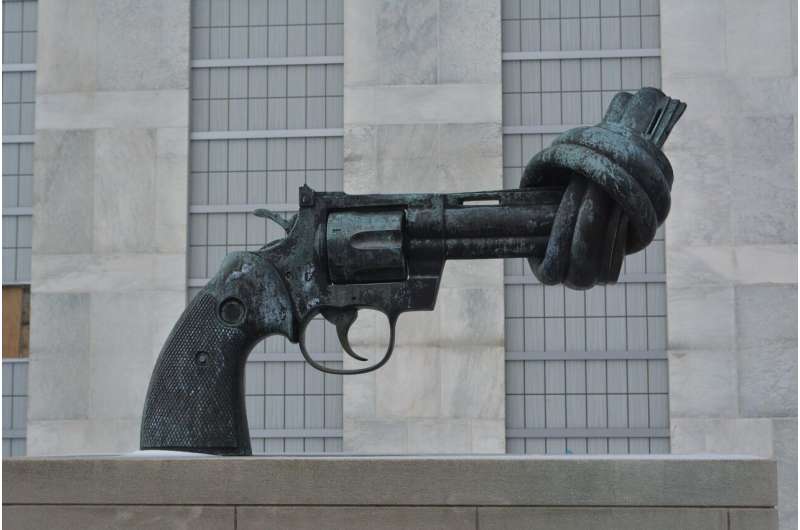New study finds racial and ethnic differences in perception and use of 'red flag' laws

New research from the UC Davis Violence Prevention Research Program finds racial and ethnic differences in how extreme risk protection orders (ERPOs) are perceived and used in California. The study, published in Preventive Medicine, found Black Californians perceived ERPOs as less appropriate and were less willing to ask a judge to approve one. Black Californians were also less likely to have legal representation at an ERPO hearing.
ERPOs—also known as "red flag" laws—are a type of civil restraining order. They temporarily prevent individuals at high risk of harming themselves or others from having access to firearms. In California, ERPOs are known as gun violence restraining orders (GVROs).
Previous research suggests ERPOs can prevent firearm-related harm, but their impact on racial and ethnic equity is largely unknown. The study provides the first empirical assessment of potential sources of racial and ethnic inequity in ERPO perceptions and use. It also offers several recommendations to promote racial and ethnic equity.
"Most of the people who participated in the study's survey, including majorities of all racial and ethnic groups, thought ERPOs were at least sometimes appropriate. And most were willing to personally ask a judge for an ERPO for a family member," said Julia Schleimer, co-lead author and a research data analyst in the Department of Emergency Medicine at UC Davis Health.
Study examined survey data and court records
To examine potential inequities by race and ethnicity, the researchers used two complementary data sources: a 2020 survey of California adults and ERPO court documents for the first three years after California's GVRO law went into effect (2016 to 2018).
The survey was completed by 2,870 participants. The sample size was weighted to be statistically representative of the adult population of California. Most survey participants had never heard of ERPOs or red flag laws.
They were asked about their willingness to ask a judge for an ERPO for a family member in response to different risk scenarios. Some of the described risk scenarios included a family member with dementia, a family member having a mental health crisis, and a family member threatening harm to themselves or others.
Black participants were most likely to say they were not willing to ask a judge for an ERPO in any of the described risk scenarios. They were also substantially less likely to say they preferred to have the police petition for an ERPO on their behalf. Black survey participants cited lack of knowledge and not trusting the system to be fair as their top reasons for being unwilling to seek out an ERPO.
ERPO-related court records showed:
- No Black or Hispanic/Latinx individuals who were subject to an ERPO had family or household members submit the petition.
- Compared with other racial/ethnic groups, Black and Hispanic/Latinx individuals subject to an ERPO were more often arrested at the time the order was served. This finding was partly explained by the higher proportion of assault-related (compared to self-directed) threats among these groups.
- Black respondents were also the least likely to have documented firearm access and legal representation at the ERPO hearing.
Veronica Pear, a co-lead author of the study and an assistant professor in the Department of Emergency Medicine at UC Davis Health, noted, "The findings suggest new directions for research, which should include engagement with Black and Hispanic/Latinx communities impacted by firearm violence. There is a need to identify barriers to and facilitators of ERPO use. Future research should also seek to understand the relationship between ERPOs and arrests, clarifying what charges are brought concurrently with the ERPO and whether the ERPO service leads to arrest or vice versa."
Recommendation to reduce inequity
"Ensuring that ERPOs do not reproduce racial-ethnic inequities in structurally rooted risk factors for violence and trauma will be critical to their effectiveness within a broader community safety ecosystem," said Nicole Kravitz-Wirtz, senior author of the study and an assistant professor with the Violence Prevention Research Program.
The researchers suggest racial and ethnic equity in ERPO use may be improved by:
- reducing barriers to petitioning
- incorporating non-law enforcement intervention professionals like behavioral health specialists into the ERPO process
- providing legal assistance to respondents and petitioners
- investing in the social safety net
"ERPOs show promise in preventing firearm violence, but it is important to monitor whether the benefits and potential harms of ERPOs are distributed equitably and amend the policy or its implementation as needed," Schleimer said.
Additional authors include A.J. Aubel, S. Buggs, R. Pallin, A.B. Shev, E. Tomsich and G.J. Wintemute from the UC Davis Violence Prevention Research Program, and C.E. Knoepke from the University of Colorado School of Medicine.
More information: V.A. Pear et al, Extreme risk protection orders, race/ethnicity, and equity: Evidence from California, Preventive Medicine (2022). DOI: 10.1016/j.ypmed.2022.107181
Journal information: Preventive Medicine
Provided by UC Davis





















